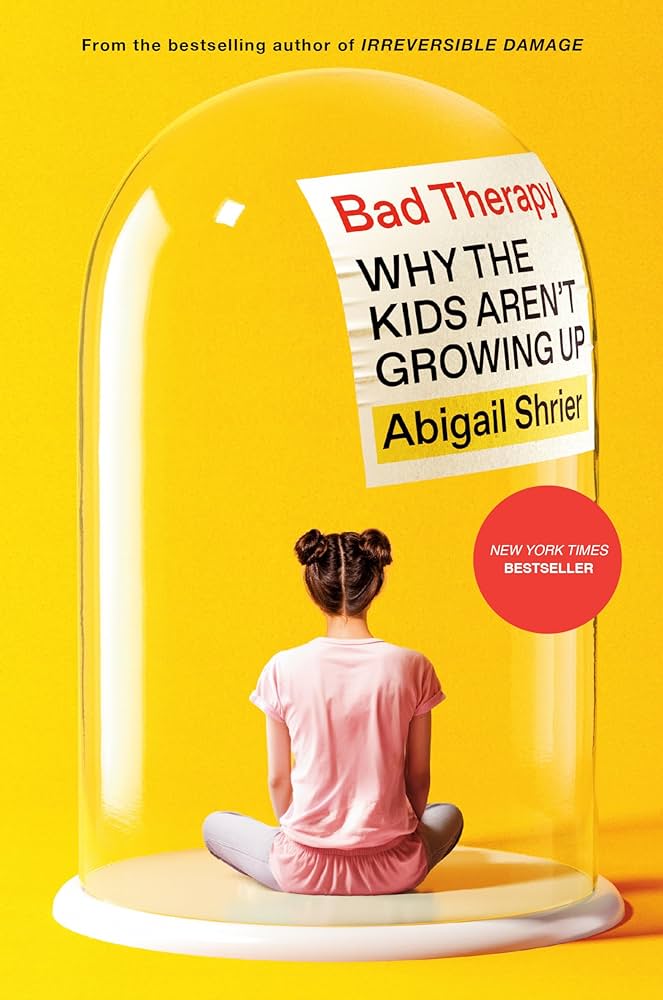Is Therapy Making Things Worse for Our Kids? Abigail Shrier, Author of Bad Therapy, Says Yes
My son returned home from sleepaway camp this summer with a stomachache. When it didn’t quickly abate, I took him to a pediatric urgent care clinic, where a doctor ruled out appendicitis. “Probably just dehydration,” came the verdict. But before the doctor cleared us to go home, he asked us to wait for the nurse, who had a few questions.
In bustled a large man in black scrubs wielding a clipboard. “Would you mind giving us some privacy so that I can do our mental health screening?” he said. After a beat, I realized that the privacy the man wanted with my son was from me.
I asked to see his questionnaire, which turned out to be issued by the National Institute of Mental Health, a federal government agency. Here is the complete, unedited list of questions the nurse had planned to put to my twelve-year-old in private:
1. In the past few weeks, have you wished you were dead?
2. In the past few weeks, have you felt that you or your family would be better off if you were dead?
3. In the past week, have you been having thoughts about killing yourself?
4. Have you ever tried to kill yourself? If yes, how? When?
5. Are you having thoughts of killing yourself right now? If yes, please describe.
When the nurse asked me to leave the room, he wasn’t going off script. He was following a literal one. The “Script for Nursing Staff” directs nurses to inform parents: “We ask these questions in private, so I am going to ask you to step out of the room for a few minutes. If we have any concerns about your child’s safety, we will let you know.”
Driving my son home from the clinic, I was haunted by the following possibility: What if I had been just a little more trusting? Children often try to please adults by producing whatever answers the grown-ups seem to want. What if my son, alone in the room with that large man, had given him the “yes” the questions appeared to prompt? Would the staff have prevented me from taking my son home?
And a child who was entertaining dark thoughts? Was this really the best way to help him? Separate him from his parents and present him with a series of escalating questions about killing himself?
I hadn’t signed my son up for therapy. I hadn’t taken him for a neuropsychological evaluation. I had taken him to the pediatrician for a stomachache. There was no indication, no reason to even suspect, that my son had any mental illness. And the nurse didn’t wait for one. He knew he didn’t have to.
We parents have become so frantic, hypervigilant, and borderline obsessive about our kids’ mental health that we routinely allow all manner of mental health expert to evict us from the room. (“We will let you know.”) We’ve been relying on them for decades to tell us how to raise well-adjusted kids. Maybe we were overcompensating for the fact that our own parents had assumed the opposite: that psychologists were the last people you should consult on how to raise normal kids.
Parents often assume that therapy with a well-meaning professional can only help a child or adolescent’s emotional development. Big mistake. Like any intervention with the potential to help, therapy can harm.
Iatrogenesis: When the Healer Makes Things Worse
Any time a patient arrives at a doctor’s office, she exposes herself to risk. Some risks arise through physician incompetence. A patient goes in to have a kidney removed, and the doctor extracts the wrong one. (“Wrong-site surgery” happens more often than you might think.) Or negligence: the surgeon loses track of a stray clamp or sponge in the patient’s abdomen, then sews her up.
Or he “nicks” an organ. Or the operation proceeds swimmingly, but the patient develops an opportunistic infection at the surgical site. Or an allergic reaction to the anesthesia. Or bedsores, from lying in recovery too long. Or everything goes according to plan, but the entire treatment was based on a misapprehension of the problem.
“Iatrogenesis” is the word for all of it. From the Greek, iatrogenesis literally means “originating with the healer” and refers to the phenomenon of a healer harming a patient in the course of treatment. Most often, it is not malpractice, though it can be. Much of iatrogenesis occurs not because a doctor is malicious or incompetent but because treatment exposes a patient to exogenous risks.
Iatrogenesis is everywhere — because all interventions carry risk. When a sick patient submits to treatment, the risks are typically worth it. When a well patient does, the risks often outweigh the potential for further improvement.
And here, what I’m calling an “intervention” is any sort of advice or corrective you would typically give only to someone with a deficiency or incapacity. So, telling kids to “eat vegetables” or “get plenty of sleep” or “spent time with friends” may be advice, but it isn’t an intervention. We all need to do those things.
With interventions, a good rule of thumb is: Don’t go in for an X-ray if you don’t need one. Don’t expose yourself to the germs of an ER just to say hello to your doctor friend. And — just maybe — don’t send your kid off to therapy unless she absolutely requires it. Everyone knows the first two; it’s the last one that may surprise you.
Psychotherapy Needs a Warning Label
For decades, the standard therapy proffered to victims of disaster—terrorist attack, combat, severe burn injury—was the “psychological debriefing.” A therapist would invite victims of a tragedy into a group session in which participants were encouraged to “process” their negative emotions, learned to recognize the symptoms of post-traumatic stress disorder (PTSD), and discouraged from discontinuing therapy. Study after study has shown that this bare-bones process is sufficient to make PTSD symptoms worse.
Well-meaning therapists often act as though talking through your problems with a professional is good for everyone.That isn’t so. Nor is it the case that as long as the therapist is following protocols, and has good intentions, the patient is bound to get better.
Any intervention potent enough to cure is also powerful enough to hurt. Therapy is no benign folk remedy. It can provide relief. It can also deliver unintended harm and does so in up to 20 percent of patients.

Excerpted from Bad Therapy: Why the Kids Aren’t Growing Up by Abigail Shrier, in agreement with Sentinel, an imprint of Penguin Publishing Group, a division of Penguin Random House LLC. Copyright © Abigail Shrier, 2024.




